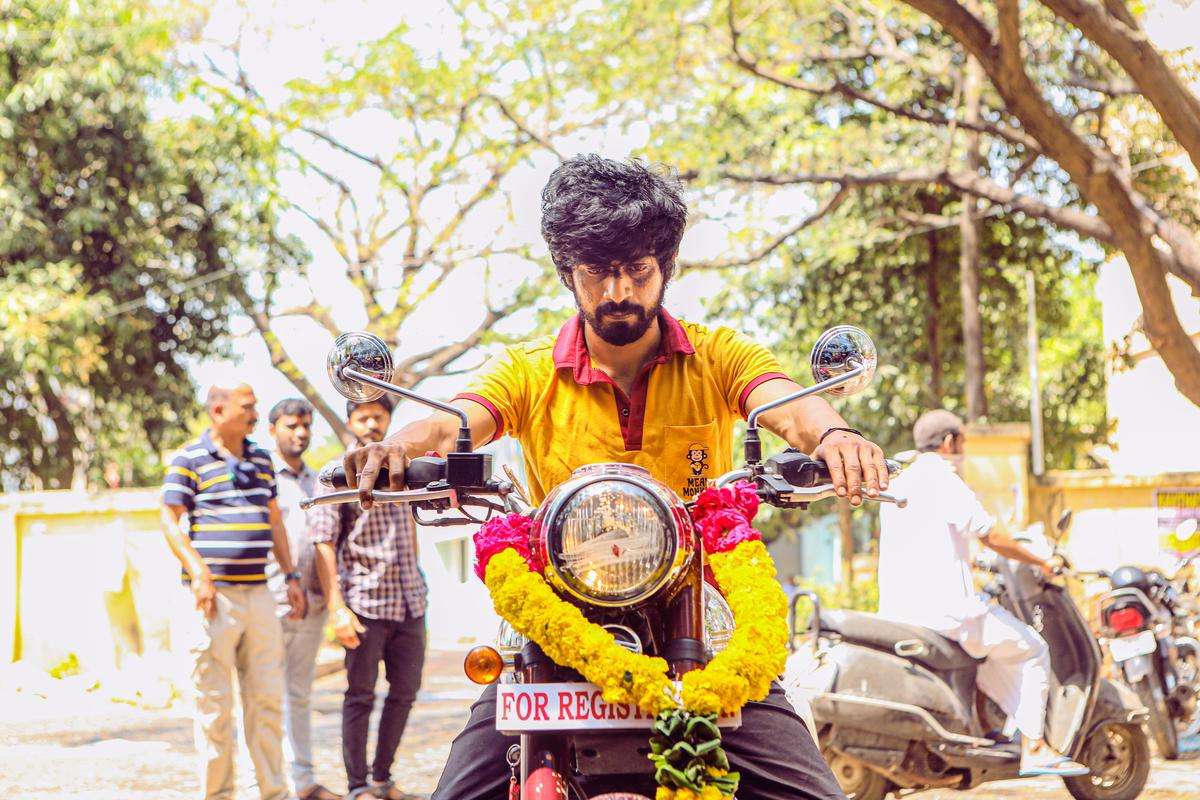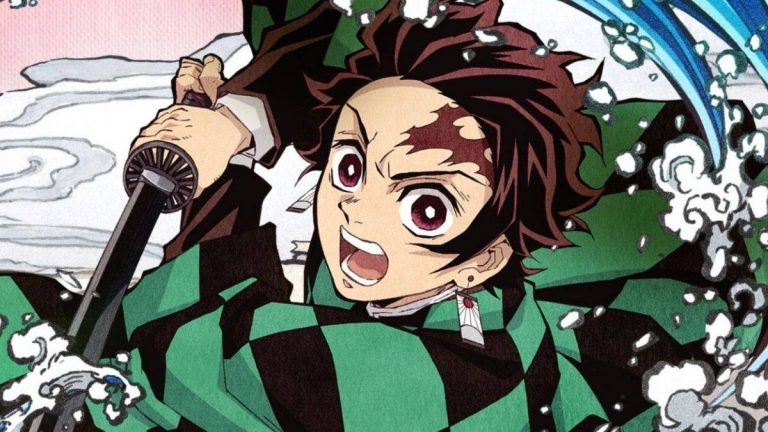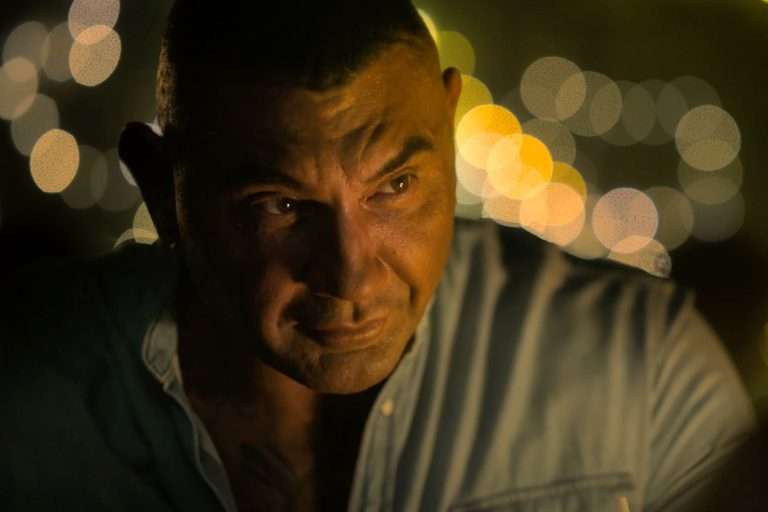Imagine a story combining the troubles faced by food delivery guys, the plight of the house help, the loneliness of aging parents with kids settled abroad, class struggle, a sweet saga of love, and an emotional father-son relationship; oh, and also throw in a bit of Shining-esque violence and a hero’s gradual giving up to his mental health condition. There, you have Aneethi!
Vasanthabalan’s Aneethi introduces us to its protagonist, Thiru (Arjun Das), within a few moments of the film’s opening. Right from the beginning, we understand that our hero is a troubled working-class guy, toiling his days away in a city where he can call no one his own. His monologues set the tone of the film, and the images of his gory murders set the mood quickly.
However, a little more into the film, we get to know Thiru has a medical condition of Obsessive-Compulsive Disorder, where he gets the constant urge to kill everyone he meets. Well, looking from his perspective, this urge does not seem like a disease but rather a normal reaction to society’s treatment of working-class men. The narrative moves quite fast from here, and we see Thiru falling in love with Subbu (Dushara Vijayan), a maid in the wealthy household of a lonely older woman. As their love story progresses, so does the life of the older woman. One fine night, Subbu calls Thiru to tell him that her employer needs to be rushed to the hospital. Upon reaching the hospital, we learn that the rich lady has died. The central conflict of the film starts brewing from here.
Aneethi is an honest effort by Vasanthabalan, a director who is quite well known for making rooted films about the struggles of the nobodies of society (Veyil, Angadi Theru). However, the problem with this particular film is that too much seems to be happening around. There are too many subplots going on, and between flashbacks and imagined scenarios, the story often feels a bit overreaching.
However, the treatment of one particular theme stands out in the film, and that is the perils of capitalism. Everything that happens in the movie can be traced back to monetary issues. If only society were a bit kinder when it came to matters of money, the whole narrative of the film would have been very different. One interesting thing here is the portrayal of the psychiatrist that Thiru visits. He’s shown to be laughing at his troubles and casually prescribing him medication.

You don’t see the empathy therapists should show, especially with a complicated case like Thiru. The doctor does not ask about his trauma or what might trigger such behavior. He’s simply happy to write some medicines and take his fees. This scene poignantly shows the very expensive therapy industry and how, even with things as important as mental health, it’s capitalism that always wins.
For a film that depends mainly on the mental health issue of the protagonist, the depiction of Thiru’s trauma could have been more emotionally engaging. His childhood trauma is addressed at a later stage in the film and seems somewhat incoherently inserted. While his backstory is quite convincingly emotional, the timing of letting the audience into that story could have been earlier. Kaali Venkat, as Thiru’s father, offers a extraordinary performance. It becomes difficult at a point to hold back your tears, looking at his smiling face, keeping the charade up for his son. Thiru’s aversion to chocolates gets a valid justification here, but all that happens a little too late.
While Aneethi is earnest about the issues it speaks about, trying to fit everything into a single narrative messes it up. In the second half, after the children of Mangayarkarasi arrive at the house, things get unnecessarily chaotic and somewhat annoying. The fact that a wealthy NRI lady can walk into a police station and shoot without consequences seems to be a bit over-dramatic representation of the class privilege in our country.
The accident of Thiru’s friend, Pothi, seems to be added only to garner some added sympathy for the protagonist and to fuel some conflict between Thiru and Subbu. As a result, the accident track loses itself in the myriad of storylines after a while, and we are left wondering what happened to Pothi or what exactly this track adds to the story.
However, despite being a bit over the top at moments, Aneethi has its heart in the right place. Arjun Das deserves a special mention for his seamless portrayal of not only the psychotic Thiru but also as a guy who is vulnerable and hungry for love. The child in him who lost his father to social injustices comes out in the scenes of vulnerability, and he rightfully owns the screen during those moments. With a great BGM that soothes during the romantic sequences and haunts during the murderous ones, Aneethi, with all its flaws, gives an age-old but essential message: kindness doesn’t cost a penny, but it’s the biggest of all the riches one can have.



![The Firemen’s Ball [1967] – A Bewitching Satire on Human Frailties and Political Groupthink](https://79468c92.delivery.rocketcdn.me/wp-content/uploads/2020/01/The-Firemen’s-Ball-1967-768x550.jpg)

![13 Reasons Why [2017]: The importance of reaching out to people](https://79468c92.delivery.rocketcdn.me/wp-content/uploads/2017/04/13.Reasons.Why_.S01E11.720p.WEBRiP.x265.ShAaNiG.mkv_20170415_100221.270-768x432.jpg)
![Train of Shadows [1997] Review: A Rich tribute to the Visual capacity of Cinema](https://79468c92.delivery.rocketcdn.me/wp-content/uploads/2019/12/tren-de-sombras-768x506.jpg)